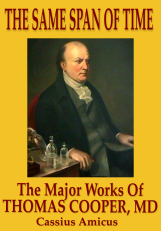An Enlightened Exchange Between Friends On The Absurdity of the Doctrine of Necessity
 One of the major implications of the First Principle Doctrine is that the doctrine of Necessity, in all its forms, is absurd and monstrous. As Epicurus wrote in his letter to Menoeceus: “It would therefore be better to believe in the fables that are told about the gods than to be a slave to the idea of Fate or Necessity as put forth by false philosophers. At least the fables which are told about the gods hold out to us the possibility that we may avert the gods’ wrath by paying them honor. The false philosophers, on the other hand, present us with no hope of control over our own lives, and no escape from an inexorable Fate.”
One of the major implications of the First Principle Doctrine is that the doctrine of Necessity, in all its forms, is absurd and monstrous. As Epicurus wrote in his letter to Menoeceus: “It would therefore be better to believe in the fables that are told about the gods than to be a slave to the idea of Fate or Necessity as put forth by false philosophers. At least the fables which are told about the gods hold out to us the possibility that we may avert the gods’ wrath by paying them honor. The false philosophers, on the other hand, present us with no hope of control over our own lives, and no escape from an inexorable Fate.”
Those who are interested in American history may find the following excerpt from an exchange of letters between Thomas Jefferson and Thomas Cooper in 1822 helpful to illustrate the same point. Follow the links for the full letters:
Thomas Cooper to Thomas Jefferson, July 16, 1822:
“…..[He] had heard a sermon one evening at Harrisburgh, from a Mr. De Witt, a Presbyterian clergyman from New York, in which the preacher declared that a man might be a good citizen, a good father, a good husband, a good neighbour, charitable, benevolent, and observant of every moral duty, — nay, he might sedulously & conscientiously attend all the ordinances of religion as a means of saving grace, but if he were not one of the elect according to the foreknowledge of God before the foundations of the world were laid, all his endeavours were not only unavailing, but savoured of sin. I well know this is in conformity with Puritan orthodoxy, and is to be found in the articles of the Church of England as well as among the Calvinistic Presbyterians; but if there be any doctrine calculated to demoralize society, to make the good bad and the wicked worse, it is such a doctrine as this.”
And Thomas Jefferson’s reply to Thomas Cooper, November 2, 1822:
“I had no idea, however, that in Pennsylvania, the cradle of toleration and freedom of religion, it could have arisen to the height you describe. This must be owing to the growth of Presbyterianism. The blasphemy and absurdity of the five points of Calvin, and the impossibility of defending them, render their advocates impatient of reasoning, irritable, and prone to denunciation.”
